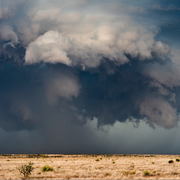Umbrella for a Rainy Day
November 7, 2023

By Ryan Sutherland, Colorado Account Executive
There are so many insurance policies to consider when it comes to protecting your ministry, and keeping track of each one’s coverages can be a mind-numbing task. One that I often hear confusion about is the Excess Liability policy, more commonly referred to as an Umbrella. While these terms aren’t exactly interchangeable in the broader insurance world, they do have a lot of overlap. For purposes of understanding your Brotherhood Mutual policy, they are basically synonymous.
Like the name suggests, an umbrella policy provides extra (or “excess”) liability[1] coverages over-the-top of existing coverages that can be shared by multiple policies. This extra coverage functionally increases the limits of the policies that are under the umbrella. Many people confuse it with their other liability policies, thinking that the umbrella is what provides the liability protections they would need if they faced a lawsuit. However, the purpose of the umbrella is simply to increase limits that already exist in your other policies, and it is typically subject to all the conditions and exclusions of the underlying policy or policies.
How do I know if our ministry needs an umbrella policy?
The primary reason for an umbrella liability policy is to protect the ministry and its volunteers/leaders from financial disaster if a major accident or lawsuit were to occur. To determine if you need one, you must consider the potential disastrous exposures of your ministry that could lead to the exhaustion of your underlying policy limits.
Every insurance policy has a per-occurrence limit for each line of coverage. In your Brotherhood Mutual policy, the per occurrence limit applies to a judgment or settlement rendered by a court or arbitration to settle a claim. The legal fees and defense costs associated with a claim are “outside the limits,” which means Brotherhood[2] will pay whatever is necessary to defend you against a claim until your limits are exhausted. The key question, therefore, regarding whether you need an umbrella is: will the per occurrence limit suffice to cover all potential damages awarded to a claimant (or claimants)?
What are the most obvious exposures that might require an umbrella policy?
- Do you have a large building or campus? Or do you operate at more than one location on a single insurance policy? Large buildings/campuses, as well as multi-sites, present greater risk for more people onsite at any given time than a ministry with a smaller footprint. Wherever you have people, you have more opportunity for accidents, nefarious behaviors, and the potential for multiple injuries from a single incident.
- Do you have a 15-passenger van or a church bus that you transport people in? Just imagine for a moment a dozen youth in your van getting in an accident because your youth leader got distracted while driving (not hard to imagine with a dozen kids in the vehicle!). If there’s even one fatality or a dozen kids injured because of this accident, you could easily exhaust your $1 million auto policy limit. That wouldn’t even begin to cover any damages or injuries to other drivers involved. Even if the driver isn’t at fault, the church could be sued and found responsible—especially when children are involved.
- Do you have a volunteer safety/security team? Are there any armed members of the team? How many armed members are there? Security teams are becoming an essential ministry team for many churches today. While Brotherhood’s policy provides excellent coverage for these individuals serving in this capacity, this coverage is limited to $1 million per occurrence. How far would this $1 million go if multiple safety team members were named in a lawsuit and the court decided they used too much force in their response during a high-stress situation? Brotherhood’s umbrella coverage includes your “security operations” endorsement.
- Do you have a board of directors, elder board, board of trustees, or council that has more than 4-5 members? Boards and councils are typically made up of quite a few individual people who would likely all be included in a lawsuit against the ministry. While they are covered individually for their decision-making role by your policy’s Directors and Officers Liability[3] coverage, this coverage is limited to $1 million per occurrence. How far would $1 million go if a court decided your ministry is responsible for financial damages and those individuals were also declared responsible as decision makers? Do you want your volunteer leaders to face financial ruin because of their role?
Each of these questions highlights potential exposures that could result in a claim or multiple claims that could easily exhaust the underlying limits of your policy. If you answered “yes” to any of these questions, then your ministry should consider an umbrella policy. They typically cost around $450 per million of coverage and can go over the top of most of the coverages you already have in your policy. Your agent can help you determine your exposures and how best to get the coverage you need.
[1] An umbrella does not increase or add any additional coverage to your policy’s property limits. It applies to liability coverages only.
[2] This is not the case with all insurance policies, so make sure you understand how your policy covers defense.
[3] Make sure your policy includes Directors and Officers Liability. I see many ministry policies that don’t have this coverage at all.
- June 17, 2024
- Church security member sentenced for murder: Lessons learned for your security team.
-

-
If you serve on or lead an armed security team, or your ministry has an armed security team, you must fully understand the huge responsibility that comes with that decision. The following incident can provide a cautionary tale for all of us to learn from.
- June 17, 2024
- Take Action Now for a Winter Free of Water Damage!
-

-
Although it's summer, now is the perfect time to take preventative measures to reduce these costly and time-consuming claims.
- May 14, 2024
- Documenting an incident: Essential information you need to capture.
-

-
Of all the liability claims that Brotherhood Mutual pays out each year, bodily injury and medical claims are at the top of the list. If your ministry hasn’t experienced a slip-and-fall incident resulting in an injury, it is just a matter of time until you do.
- May 14, 2024
- Have you reviewed your Governance Documents?
-

-
For most churches, and many nonprofits, the end of the school year signals the end of the ministry year. Many of those same churches and nonprofits have fiscal year ends as of June 30. This is a great time to review what is commonly called your organizational “governance” documents.
- May 14, 2024
- Can Claims Be Avoided?
-

-
As I sit here in Kansas watching the news and reports of severe weather in my State and those States that surround me, I must remind myself, “there is not much I can do about this.” As a “fixer” this is difficult for me. The storms are going to roll in and at least we have the weather service who helps prepare us to “stay out of the way.” To answer my own question, we cannot avoid weather related claims.
- May 14, 2024
- From the Exiled Nigerian Prince to a Trusted Vendor: It's Time to Pay Attention to Cyber Threats
-

-
Remember the days when hackers were imagined as shadowy figures living in their parent's basements, playing video games, and eating Doritos while crafting scam emails? Well, that image is now outdated. The world of cybercrime has evolved, and it's both sophisticated and terrifying. According to a recent annual cyber claims report from an insurance carrier called, Coalition, the Federal Bureau of Investigation (FBI), received more than 880,000 complaints of cybercrime in 2023 with reported losses of $12.5 billion.
- April 11, 2024
- Mission Trip Fundraising
-

-
If your church or nonprofit engages in short-term, summer mission trips, this time often signals the beginning of fundraising projects. Before you appeal for donations, it is important to review the rules of what the IRS calls “deputized fundraising” making sure you have the proper policies and procedures in place to maintain compliance. Failure to maintain compliance could result in the loss of your tax-exempt status.
- February 19, 2024
- Is Your Facility Use Agreement Working For You?
-

-
With Valentine’s Day upon us and the official May-to-October wedding season not far behind, many couples are searching for the perfect wedding venue. Schools and performing arts organizations are looking for end-of-year performance and graduation venues. Your church or nonprofit facility might be the perfect match. Engaging the opportunity has stewardship and community outreach benefits. But opening your facilities to other activities and users involves risk. A Facility Use Policy sets the standard for your facility use. A Facility Use Agreement implements that standard. To be effective, leaders must answer three questions.
- February 19, 2024
- PART TWO: How protected are members of your safety team? The answer may surprise you.
-

-
The focus of this article is to address some of the risks and liabilities associated with having an armed safety team. Click here to read PART ONE.
- February 19, 2024
- Client Success Advisors at your Service!
-

-
Over the last few years, our agency has continued to grow and expand across the Midwest & Rockies, now spanning six states: Nebraska, North Dakota, South Dakota, Kansas, Colorado, and Wyoming. Serving over 3,000 ministries and nonprofit organizations, we are deeply grateful for the opportunity to support you.
- February 19, 2024
- 5 Predictions on What is Going to Happen in 2024's Church Insurance Market
-

-
Do you ever feel like some words just get overused? I do. I live in a house with two teenagers and a sweet little boy who watches everything they do. The word "literally", gets used in 80% of sentences... It isn't even impactful anymore. It means nothing. Because if they didn't use that word, I would just expect that most of what they were saying was metaphoric in nature.
- January 12, 2024
- Worker Classification Risk: Employee v. Independent Contractor
-

-
The new year signals the end of one payroll year and the beginning of another. As you process employee W2s and independent contractor 1099s, take time to evaluate a critical aspect of your ministry business risk management program: proper worker classification. While the percentage of the American workforce comprising “contingent workers” (independent contractors, contract employees, temporary employees, leased employees) was rapidly increasing before COVID, since COVID and the acceptance of the remote workplace, use of contingent workers has skyrocketed. You probably have several on your payroll.
- January 12, 2024
- How protected are members of your safety team?
-

-
Over the last few years, I have had the opportunity to speak with several thousand church safety team members across the country. By far the most common question I get from this group is “Am I covered if something bad happens?” This is not a question that only pertains to armed safety team members. Truth is, anyone who serves in the protection of a ministry should be asking that question. The purpose of this article is to help ministries be better informed and more prepared in advance of an incident occurring.
- January 12, 2024
- Stay Ahead of the Freeze: Sign Up for Text Alerts
-

-
We’re encouraging all customers to stay ahead of the freezing weather by signing up to receive Extreme Freezing Weather Text Alerts from Brotherhood Mutual. It’s new. The alert also links to actions you can take immediately to prevent or minimize damage to your buildings before forecasted weather arrives.
- January 12, 2024
- There's Something for Everyone at this Year's 2024 Ministry Boot Camp!
-

-
Join us for a comprehensive, one-day training for all! Tailored breakout sessions cover complex HR topics for administration and provides in-depth training, including a deeper review into de-escalation, for the security team. In the afternoon, unite in a deep dive on child safety with proprietary insights the anatomy of an abuse claim and protecting our youth.
- December 20, 2023
- Wishing you a Merry Christmas – 80s Style
-

- November 7, 2023
- Three common pitfalls that may be hidden in your church's lease
-

-
One positive aspect of today’s challenged economy is the availability of underutilized or empty commercial space. Before your ministry takes the plunge into a lease agreement, we want to make sure you're well-informed and prepared to avoid some common pitfalls.
- November 7, 2023
- Insurance Companies Are Forced To Respond To Unprecedented Market Strain. What Does This Mean For You?
-

-
In this month's perspective on the insurance market, I wanted to talk about the massive upward trending we are seeing in cancellation of policies. Our agency has observed a remarkable surge in inquiries from churches not currently under our insurance coverage. These churches are facing non-renewal by their existing carriers, a trend that has expanded beyond the norm of non-renewals due to excessive losses. Instead, carriers are now opting not to renew based on the risk profile of the ministry, which encompasses factors like geography, insured value, and construction type.
- November 7, 2023
- Umbrella for a Rainy Day
-

-
There are so many insurance policies to consider when it comes to protecting your ministry, and keeping track of each one’s coverages can be a mind-numbing task. One that I often hear confusion about is the Excess Liability policy, more commonly referred to as an Umbrella. While these terms aren’t exactly interchangeable in the broader insurance world, they do have a lot of overlap. For purposes of understanding your Brotherhood Mutual policy, they are basically synonymous.
- October 6, 2023
- The Crucial Role of Key Man Life Insurance for Church Pastors
-

-
In recent times, our team has observed a growing demand for key man life insurance, particularly within the realm of church leadership. Pastors are the spiritual pillars of their congregations, providing guidance, support, and a sense of community. While their spiritual contributions are invaluable, it's equally important to consider their financial well-being and the stability of the church should an unforeseen tragedy occur.